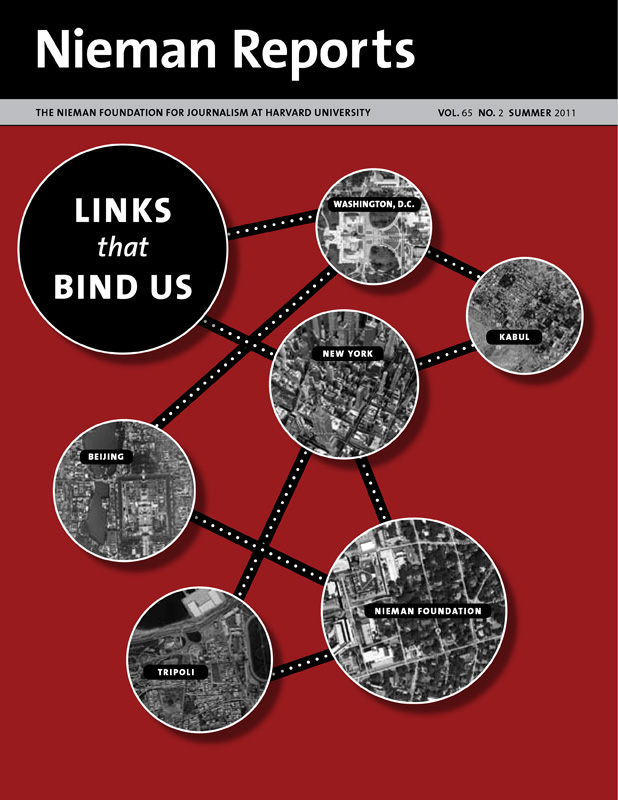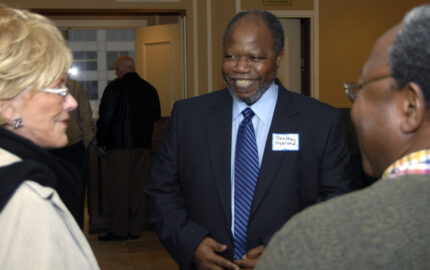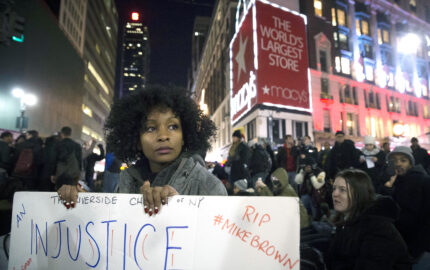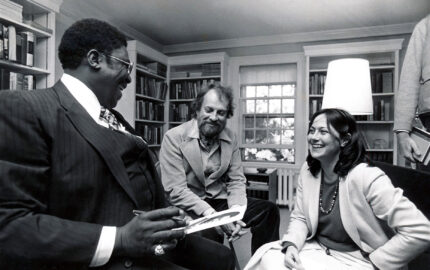D. Parvaz, freed in May after 19 days of captivity in Syria and then Iran, wrote a postscript to the accompanying essay, which she had written before her detention.
RELATED ARTICLE
“Landing in Al Jazeera's Vibrant Newsroom”
- D. Parvaz Imagine having a story you can't wait to write, not because it's a thing of beauty or joy, but because of a sense of horror and immediacy. It's how I felt with a story I was dying to tell while being held for three days in a Syrian detention center and hearing young men being tortured and beaten around the clock.
But then, the Syrians deported me to Iran, where for more than two weeks I lived in solitary confinement, incommunicado, while the Iranian government investigated me on spying charges. No pen. No keyboard. No phone. Still, I kept inside my head that story and the cries I heard in the night, as I held imaginary conversations with the two young women with whom I'd shared cells in Syria, "Patience, sisters. I'll tell your stories. Patience."
For two weeks I gnawed away at myself for missing a deadline only I knew about, hoping that with each minute, I was getting closer to being released so I could describe what I saw in Syria.
The Iranians, who treated me quite well, were baffled by my anxious state. They couldn't understand its source, nor could I explain everything to them. So I put it down to worrying about my family, which, make no mistake, was the truth. I worried all the time about them. I knew my freedom would comfort my family, but the Syrians being held in that bizarre, secret detention center would likely still be there. All I could do was to tell about their suffering that I'd witnessed.
Within 18 hours of being released, I called my family, filed a piece, did three interviews, cut the huge cake magically procured by Al Jazeera and happily stared at the faces of my colleagues, all of whom had been working tirelessly to help secure my release. Then I had a few minutes to try to catch up on all the e-mails I'd received for the 19 days that I was missing/detained in Syria and Iran.
I was—and remain—floored by what I found. Of course, I knew that my family and Al Jazeera had been strategizing around the clock to find me and bring me back home. What I wasn't prepared for was the support that seemed to spring up from all corners of the world, with my fellow Niemans leading the charge.
When you fall down a rabbit hole, as I did, what you mostly feel is alone. You know people might notice that you're gone, but you have no idea that people are writing stories about you, from Cleveland to Dublin, alerting the world to your plight in the Swedish press and on NPR, and coordinating letter-writing campaigns and e-mails to diplomats and members of Congress.
So when you do find out, you are rendered speechless. I was. All I felt was a severe sense of gratitude that manifested itself as a massive lump in my throat until words were ready to come out, and here they are:
RELATED ARTICLE
“Landing in Al Jazeera's Vibrant Newsroom”
- D. Parvaz Imagine having a story you can't wait to write, not because it's a thing of beauty or joy, but because of a sense of horror and immediacy. It's how I felt with a story I was dying to tell while being held for three days in a Syrian detention center and hearing young men being tortured and beaten around the clock.
But then, the Syrians deported me to Iran, where for more than two weeks I lived in solitary confinement, incommunicado, while the Iranian government investigated me on spying charges. No pen. No keyboard. No phone. Still, I kept inside my head that story and the cries I heard in the night, as I held imaginary conversations with the two young women with whom I'd shared cells in Syria, "Patience, sisters. I'll tell your stories. Patience."
For two weeks I gnawed away at myself for missing a deadline only I knew about, hoping that with each minute, I was getting closer to being released so I could describe what I saw in Syria.
The Iranians, who treated me quite well, were baffled by my anxious state. They couldn't understand its source, nor could I explain everything to them. So I put it down to worrying about my family, which, make no mistake, was the truth. I worried all the time about them. I knew my freedom would comfort my family, but the Syrians being held in that bizarre, secret detention center would likely still be there. All I could do was to tell about their suffering that I'd witnessed.
Within 18 hours of being released, I called my family, filed a piece, did three interviews, cut the huge cake magically procured by Al Jazeera and happily stared at the faces of my colleagues, all of whom had been working tirelessly to help secure my release. Then I had a few minutes to try to catch up on all the e-mails I'd received for the 19 days that I was missing/detained in Syria and Iran.
I was—and remain—floored by what I found. Of course, I knew that my family and Al Jazeera had been strategizing around the clock to find me and bring me back home. What I wasn't prepared for was the support that seemed to spring up from all corners of the world, with my fellow Niemans leading the charge.
When you fall down a rabbit hole, as I did, what you mostly feel is alone. You know people might notice that you're gone, but you have no idea that people are writing stories about you, from Cleveland to Dublin, alerting the world to your plight in the Swedish press and on NPR, and coordinating letter-writing campaigns and e-mails to diplomats and members of Congress.
So when you do find out, you are rendered speechless. I was. All I felt was a severe sense of gratitude that manifested itself as a massive lump in my throat until words were ready to come out, and here they are:
For all that my fellow Niemans and the Nieman Foundation—especially friend and curator Bob Giles—did to help free me, to keep my name out there and to let the Iranian government know that I am no spy, I say "thank you." Thank you for the countless tweets, letters, Facebook posts, articles and more. Thank you for helping your fellow fellow out of one heck of a jam. And thank you for helping free me so that I could finally share what is happening to those still held in Syria.



